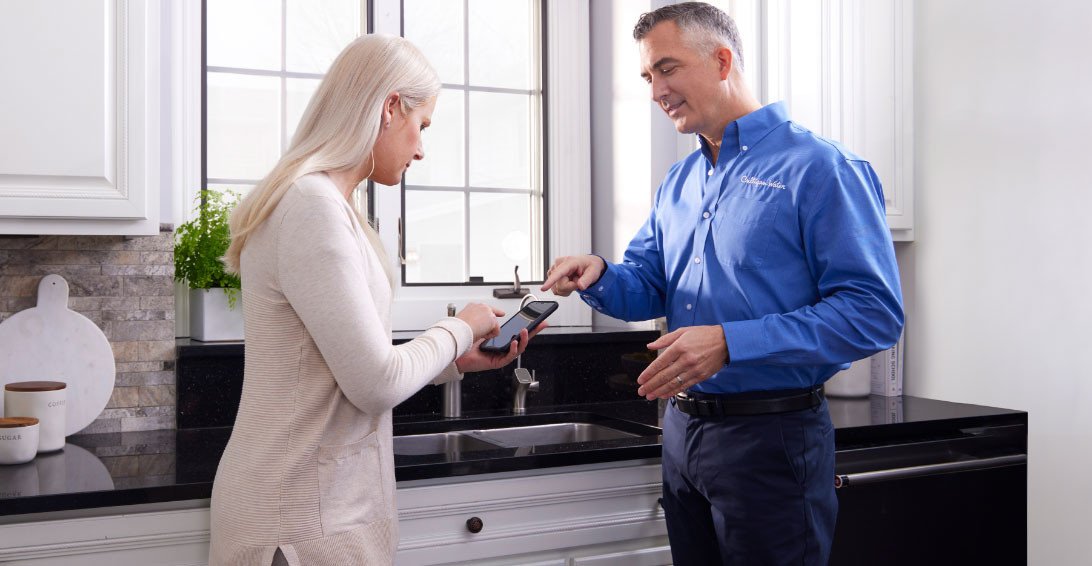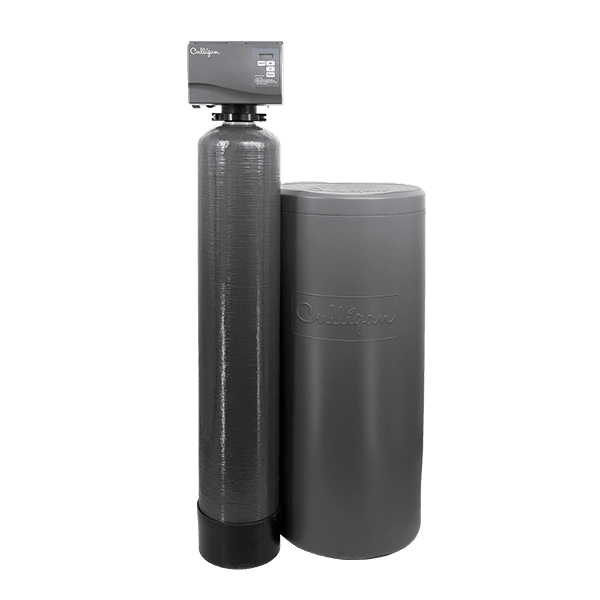Aquasential® Select Series® Water Softener
Say goodbye to the hassles of hard water

Benefits of Aquasential® Select Series® Water Softener
Enjoy longer-lasting appliances
Reduce damaging scale buildup in water heaters, humidifiers and other water-using appliances throughout your home.
Decrease operating costs & save on cleaning supplies
Spend less on soaps, detergents, lotions, water, electricity and other utilities.
Conserve soft water for when you need it most
The patented Cul-Flo-Valv® allows you to bypass these systems when you don’t need soft water, like when you are watering your lawn.
Monitor daily usage & regenerate only when required
Culligan’s meter option monitors daily water use and activates regeneration only when needed to conserve salt and water.
Financing terms defined by third-party vendor if applicable. Dealer participation varies. See dealer for details.

As low as $25 per month
A Culligan Aquasential® Select Series® Water Softener gives you
How a water softener works
Water softening utilizes a process called "ion exchange" to remove dissolved minerals such as calcium and magnesium.
These minerals can’t be trapped by a filter, so a molecular reaction is required. Water softeners have resin beads that hold onto sodium, and as the hard water flows through the resin, the sodium is swapped for the hard water minerals. The hard water minerals are trapped in the softener and a trace amount of sodium flows out with the softened water.
Frequently asked questions
Hard water occurs naturally in more than 85% of the water supply in North America. Hard water contains dissolved minerals like calcium and magnesium. When this water dries, minerals stick to everything water touches — including your plumbing, hair and skin.
According to the Water Quality Association, hard water contains dissolved minerals above one grain per gallon (GPG), though relative levels of hardness have been established and are as follows:
According to the Water Quality Association, hard water contains dissolved minerals above one grain per gallon (GPG), though relative levels of hardness have been established and are as follows:
- Soft - less than 1 GPG
- Slightly hard - 1 to 3.5 GPG
- Moderately hard - 3.5 to 7 GPG
- Hard - 7 to 10.5 GPG
- Very Hard - 10.5 and higher GPG
The presence of hard water in your home results in:
- Limescale buildup around faucets or showerheads
- Soap scum on shower walls, bathtubs, sinks and other fixtures
- Plumbing and pipe corrosion
- Streaky or spotted dishes
- Stiff, scratchy laundry
- Irritated, dry skin or dull, lifeless hair
- Decreased efficiency of appliances and more frequent breakdowns
- An increase in the amount of soap and detergent needed for cleaning
You don't have to be a water expert to understand the basic principles behind water softening and water filtration. Here's an abridged version of what happens when you soften or filter water.
Softening water involves a process called "ion exchange" to remove dissolved minerals such as calcium and magnesium that can't be trapped in a filter bed. Softeners contain resin beads with sodium attached. As water enters the tank, dissolved calcium and magnesium are attracted to the resin. The resin swaps the sodium in exchange for the dissolved minerals, helping to remove the impurities from the water.
Meanwhile, filtering water involves the separation of particles from H2O. By passing water through a "filter bed" or "media bed", these granular particles are trapped and cleaner water flows to your tap. Water filters reduce a wider array of contaminants than water softeners.
Softening water involves a process called "ion exchange" to remove dissolved minerals such as calcium and magnesium that can't be trapped in a filter bed. Softeners contain resin beads with sodium attached. As water enters the tank, dissolved calcium and magnesium are attracted to the resin. The resin swaps the sodium in exchange for the dissolved minerals, helping to remove the impurities from the water.
Meanwhile, filtering water involves the separation of particles from H2O. By passing water through a "filter bed" or "media bed", these granular particles are trapped and cleaner water flows to your tap. Water filters reduce a wider array of contaminants than water softeners.
Yes, for nearly everyone it is safe to drink softened water. Some people are concerned that drinking softened water will increase the level of sodium in their diet. But the amount of sodium added to water during the softening process is low. If sodium levels remain a concern, combining your water softener with a reverse osmosis drinking water system can help to reduce salt and potentially harmful contaminants.
Yes, to continue operating at peak performance, a water softener requires regular maintenance. Having your local Culligan water expert perform an annual inspection on the equipment will not only extend the lifespan of your water softener, but it also has the potential to decrease future repair costs. Part of this inspection will include water testing, which helps to identify other contaminants that may impact operation.
Water softeners are usually trouble-free. Especially if salt levels are regularly monitored. Culligan water can help with scheduled salt delivery service that checks over the unit and saves you from transporting and lifting those heavy bags.
But if you prefer to do it yourself, make sure to use quality solar salt. That should lessen another issue — salt bridging in the brine tank. A salt bridge is a layer of hardened salt crust. If you suddenly lack soft water or your softener stops using salt, you should check the brine tank before calling for service. High temperatures, humidity or poor salt quality can create a bridge and prevent the softener's resin beads from regenerating. In clearing salt bridges, use caution because improper cleaning can puncture a hole in the wall of your water softener.
Water softeners are usually trouble-free. Especially if salt levels are regularly monitored. Culligan water can help with scheduled salt delivery service that checks over the unit and saves you from transporting and lifting those heavy bags.
But if you prefer to do it yourself, make sure to use quality solar salt. That should lessen another issue — salt bridging in the brine tank. A salt bridge is a layer of hardened salt crust. If you suddenly lack soft water or your softener stops using salt, you should check the brine tank before calling for service. High temperatures, humidity or poor salt quality can create a bridge and prevent the softener's resin beads from regenerating. In clearing salt bridges, use caution because improper cleaning can puncture a hole in the wall of your water softener.
Water softener size/capacity refers to how much the system can handle before regeneration is necessary. Capacity also impacts the amount of salt needed over time to make sure that the device can continue to treat water hardness.
The exact size/capacity of the water softener needed in your home depends on a variety of factors, including:
Ultimately, the process of selecting the best water softener for your home doesn’t have to be complicated. Working with your local Culligan water expert is a quick and easy way to find the correct size for your household. Getting this right is important for ensuring the best water quality and maximum efficiency.
The exact size/capacity of the water softener needed in your home depends on a variety of factors, including:
- The hardness of your water
- The service capacity from your well or municipal water supply
- Your typical household water usage
- Overall flow rate
Ultimately, the process of selecting the best water softener for your home doesn’t have to be complicated. Working with your local Culligan water expert is a quick and easy way to find the correct size for your household. Getting this right is important for ensuring the best water quality and maximum efficiency.
This product can help solve Wooster, OH water problems such as
Get pricing & special offers
Call 877-984-1822 or fill out the form to get a custom water solution.
Thank you for contacting us.
One of our local water experts will contact you shortly.
We ran into an issue submitting your form, please call
866-330-4482
to connect with your Culligan Dealer.




